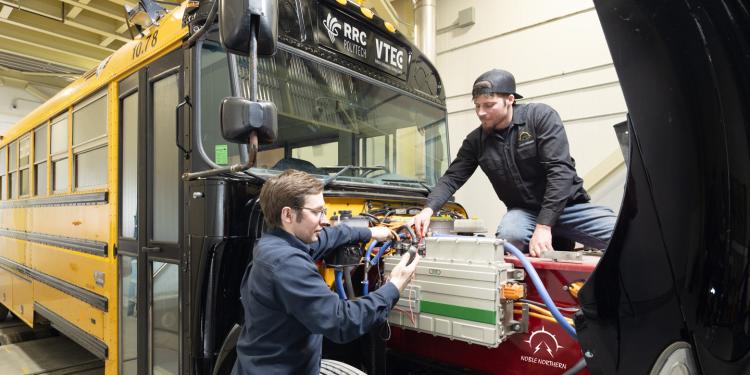Manitoba's first low-carbon school bus - converted from diesel to electric power - rolled out of RRC Polytech's Vehicle Technology & Energy Centre (VTEC) this week, demonstrating the viability of a cost-effective process to electrify current vehicle fleets and reduce the environmental impacts of fossil fuels.

Funded by the province's Conservation and Climate Fund and the Canadian Shield Foundation, the diesel-to-EV school bus conversion kit is the result of collaboration between VTEC's expert researchers, industry partners Northern Noble and representatives from the Seven Oaks School Division. The conversion kit reduces greenhouse gas emissions, cuts costs for schools and the government, and offers an affordable alternative to factory-built electric buses.
"Our work on the electric school bus conversion kit is the latest example of how applied research collaborations with industry partners support market-driven innovation and product development," says Fred Meier, President and CEO of RRC Polytech.
"This project is an example of the applied research expertise and facilities RRC Polytech has developed over the last 20 years that contribute to advancing technologies to support Manitoba's energy transition."
The project began in August 2023, when Seven Oaks provided a bus suitable for conversion and students from RRC Polytech's Heavy Equipment Mechanic program removed its diesel engine before transferring the bus to the team at Noble Northern.
VTEC's researchers then joined Noble Northern - with whom they'd partnered years earlier to help develop an EV Tundra Buggy for Frontiers North Adventures in laying the groundwork for converting the bus, including the preliminary design for the electric drive system and the procurement of electric motors, batteries, controllers, inverters and other essential accessories in the conversion kit.
After the installation and commissioning phase, the newly converted bus was returned to RRC Polytech for rigorous environmental performance evaluations within MotiveLab , VTEC's climatic chamber.
Even with labour costs considered, using the conversion kit to retrofit an existing diesel bus saves over $100,000 compared to the price of a new factory-built electric bus, freeing up valuable budget for school divisions to reinvest directly into their classrooms while significantly reducing their carbon footprint.
The benefits of converting just one bus also include up to $11,000 in fuel cost savings and a reduction of 21.6 tonnes of carbon dioxide emissions per school year, as well as lower maintenance costs and the elimination of air and noise pollution.
"VTEC is proudly regarded as a Canadian leader in EV technology," says VTEC program manager Jojo Delos Reyes. "By seeking cost-effective methods to reduce emissions and source renewable energies for fuel for fleet vehicles like school buses, we're helping to build and maintain a sustainable future while training the workforce of tomorrow.
"This successful collaboration has proven what is possible - now we're ready to literally drive it forward. Our next steps are to explore commercialization and scaling possibilities of the conversion process, and to connect with partners who are interested and motivated to adopt this new technology."
At an on-campus unveiling event this week, the Hon. Mike Moyes, Minister of Environment and Climate Change, heralded the project team for its commitment to the environment and the economy.
"Manitoba is committed to advancing clean transportation solutions that protect our environment while ensuring safe and sustainable mobility for students," said Moyes.
"We're thrilled that the result of this collaboration... not only offers an alternative to importing costly technology, but the potential to stimulate our local economy through job creation and growth."













